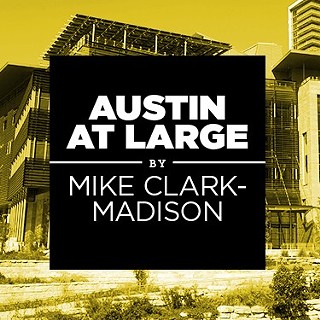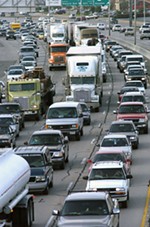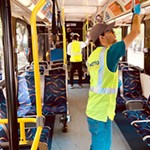Austin at Large: This Road’s Gone On Forever
Is it wrong, or dumb, or evil to spend billions to fix I-35?
By Mike Clark-Madison, Fri., May 17, 2019
As you'll see elsewhere in this issue, last week, the City Council affirmed Austin's support of the Green New Deal and discussed new steps the city can take to put some more oomph! behind its once-pacesetting commitment among U.S. cities to address the impact of climate change. That's ... nice!
Four of those Council members also sit on the Capital Area Metropolitan Planning Organization's Transportation Policy Board, including that body's chair, Mayor Steve Adler. Earlier in the week, they joined the other 16 board members (elected and appointed officials in the six-county CAMPO region) to reaffirm – at the low, low price of $400 million – that adding lanes to I-35 is Central Texas' top priority for transportation investment. That's ... different?
I consider myself a fatalistic climate hawk. Austin should work hard to reach our adopted community goal of net-zero carbon emissions by 2050. But I expect us to expend more effort to clumsily adapt to, rather than avert, our harsh climate realities – or, framed more nobly, to build our resilience. Our transportation system is doing great damage to our planet, but as long as we feel the need to move ourselves and our things from this place to that place at a certain speed, we'll be trying to make that system better and clean up after ourselves as we go along.
Many CAMPO board members are not as convinced as you or me that a De-Industrial Revolution is feasible, let alone mandatory, to address the apocalypse nigh. But one need not be a climate hawk to think it's at least a bit absurd, and a bit indecent, for our local powers to saddle up for this last I-35 buffalo hunt. Regardless of the starting point, this is a road that need not go on forever, because the party will surely end. If it hasn't already.
The Enduring Illusion of Control
I may be jaundiced through age in my views, having written about similar plans to make similar changes to this highway in this paper since the Clinton administration. The long-proposed grand fix of I-35 through the city center – to be wider, faster, tolled, free, cut, capped, elevated, at grade, cantilevered, or whatever – has never happened, and the city and region have just about doubled in population since then, and the cost of building out that fix has grown faster than that, even in constant dollars: It's now $8 billion.
By throwing all of its available funding at I-35, CAMPO wants to persuade the state and feds to do likewise, so we can "address the congestion on IH 35 that directly impacts mobility, safety, and the quality of life in this region and the State of Texas," in the language of the resolution adopted May 6. Let's be very, very generous and accept as a given that this comports not only with Austin's vision of climate resilience but also the city's goal – as elucidated in the Austin Strategic Mobility Plan that Council just adopted last month – to reduce vehicle miles traveled and shift demand away from single-driver car trips. (Perhaps a rebuilt I-35 would support better bus service, improved east-west connectivity, more efficient freight movement, or whatnot.)
I'm pretty doubtful that laying down $8 billion along the 33 miles between Round Rock and Buda would "address" I-35 congestion in more than a few specific spots at the critical hours when conditions really are less than acceptably safe. We all should have internalized by now that actually reducing traffic cannot be done, for more than a minute, by creating capacity. Induced travel demand is a real thing, and the beautiful wide-open pavements of our suburban ring roads create naught but a sugar high.
We Can Do More Than Not Hurt Ourselves
The last time we had this regional conversation – and the time before that, and before that – people of good faith had already conceded that only long-term, ground-up changes in how we use and share our land and our wealth are sufficient to calibrate our demands for mobility to the available supply. Climate disaster is just the latest, sharpest goad that drives us toward that end.
As a near-term gesture of realpolitik, the CAMPO all-in commitment to I-35 has at least some symbolic upsides. It asserts that mobility in the economic and sociopolitical heart of the region is more valuable than $400 million worth of random, meaningless road projects in Austin's hinterlands. (As we are oft reminded, the big spigots of state transportation money opened by voters in recent elections can only be spent on roads.) It probably reduces the damage the region and state would inflict upon itself otherwise. It might be a net plus for that money to never be spent.
But getting to a political reality where we reallocate nine-digit sums away from highways and toward more sustainable mobility – high-capacity transit, properly deployed autonomous vehicles, high-speed public broadband that reduces travel demand, pick your pleasure – is going to take overturning the current regimes in Texas and D.C., full stop, even before you get to de-carbonizing the economy. It's surely an opportunity to think more radically, more intelligently, and more morally about infrastructure for a new world, not the faded goals of our past.
Got something to say? The Chronicle welcomes opinion pieces on any topic from the community. Submit yours now at austinchronicle.com/opinion.









